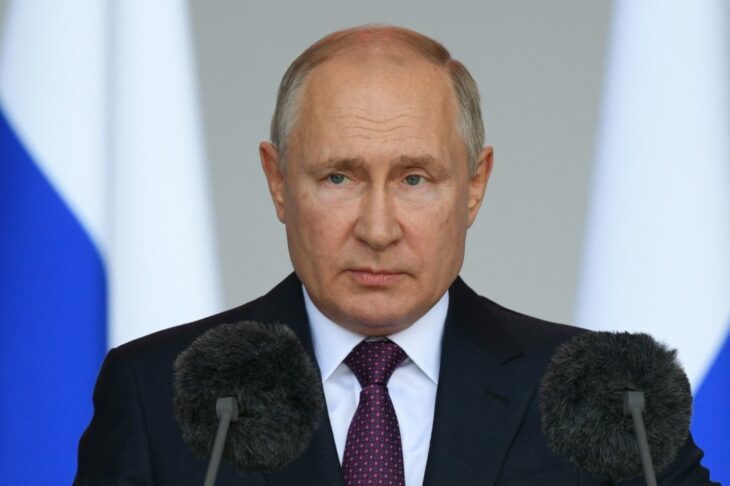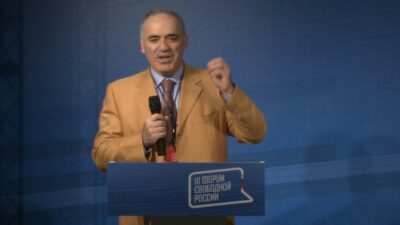RT Deutsch, the Kremlin-backed media outlet, has become a major player on social media just weeks before the polls open

video on YouTube alleging anti-vaccine conspiracy theories in Germany was viewed more than a million times. A Facebook post promoting a local far-right political party was shared by tens of thousands of people. A Twitter message attacking a leading politician ahead of the country’s upcoming election was liked repeatedly over months.
Thousands of social media posts like these are spreading through Europe’s largest economy, and they all come from RT Deutsch, the Kremlin-backed media outlet.
In total, the Russian broadcaster — whose aim is to provide an alternative to the Western media’s perspective on current affairs and promote Russian President Vladimir Putin’s strategic interests — has become the most prominent media outlet on social media in Germany just weeks ahead of the country’s federal election on September 26.
Since March, RT Deutsch has focused on promoting anti-vaccine fears around the COVID-19 pandemic and championing the far-right Alternative for Deutschland (AfD). Its efforts, collectively, have racked up roughly 22.7 million interactions on Facebook in the form of comments, likes and shares, according to research from the German Marshall Fund (GMF) of the United States, a Washington-based think tank.
Those figures place the Kremlin-backed media organization at the top of the social media leader board compared to mainstream German publishers like Bild, the national tabloid owned by Axel Springer (which is also co-owner of POLITICO) and Deutsche Welle, the country’s international, publicly-owned broadcaster, based on analysis from CrowdTangle, a Facebook-owned analytics tool.
“There’s clearly a huge demand for what Russia is selling here among Germans. And that, I think, across the West is deeply concerning,” said Bret Schafer, head of the information manipulation team at GMF’s Alliance for Securing Democracy.
“It’s clear where this content is coming from. This isn’t like a covert information operation where there is some partisan site that Russia has spun up,” he added. “They are somehow outperforming most, if not all, of the traditional media outlets.”
Counting down the days
RT Deutsch has reached a wide audience in Germany just as polls tighten in the weeks running up to the election, according to POLITICO’s poll of polls data. As Angela Merkel steps down after almost 16 years as the country’s chancellor, the Social Democrats (SPD) are currently leading Merkel’s Christian Democrats (CDU) in the polls, with the Green Party in third.
Much of the Kremlin-backed broadcaster’s content complements a spike in election-related misinformation, mostly channeled via domestic conspiracy and extremist groups who have borrowed tactics from their American counterparts to sow distrust around the upcoming vote, particularly related to mail-in ballots.
Misinformation experts said that RT Deutsch’s focus on anti-vaccine narratives — nine out of the outlet’s top 10 most-viewed YouTube videos are related to these conspiracy theories, and have together garnered almost 6 million views — targets a sizeable minority of Germans who remain skeptical about the efficacy of COVID vaccines.
During the pandemic, far-right extremists, anti-government groups and believers of the so-called QAnon conspiracy theory coalesced around their opposition to vaccines and Berlin’s efforts to mandate mask wearing and other precautions. GMF’s research and POLITICO’s separate analysis found that the Russian media outlet has played on those fears, repeatedly questioning the effectiveness of Western vaccines and highlighting bogus claims that they cause harmful side effects.
“High number of unreported vaccine deaths? Heidelberg pathologist calls for more autopsies,” read one RT Deutsch article from August, which was shared, commented on and liked tens of thousands of times on Facebook, including in overtly anti-vaccine private groups.
“They have begun to reach out to much wider groups than before,” said Anneli Ahonen, a senior fellow at the Institute for Strategic Dialogue, a think tank that tracks online extremism. “Foreign state-sponsored anti-vaccine messaging shows that approach in Germany. It’s sowing distrust in the government and focuses on internal divisions.”
Pro-AfD, anti-Green
Ahead of the September 26 vote, the Kremlin-backed outlet is also pursuing a double strategy of promoting AfD, while attacking the Green Party, especially its leader, Annalena Baerbock. They also make routine references to both the CDU and SPD political parties, but mostly leave these groups alone in terms of promotion or attacking their polices.
RT Deutsch has not directly waded into the upcoming election. But it has repeatedly championed AfD talking points, including an anti-refugee stance and an end to COVID restrictions, while promoting controversies related to Baerbock, whose anti-Russia stance threatens the Kremlin’s interests. In a recent plagiarism scandal involving the German politician, the Russian outlet produced a series of articles that provided blow-by-blow details of Baerbock’s alleged wrongdoing.
For Kristine Berzina, a senior fellow also on GMF’s Alliance for Securing Democracy team, that strategy aligns with the Kremlin’s geopolitical interests of cheerleading current events that fit with Russia’s wider world view.
In recent weeks, for instance, RT Deutsch has framed the Taliban’s takeover of Afghanistan to its German online audience as emblematic of the West’s fall from grace, and slammed a recent German court ruling against a proposed natural gas pipeline between Germany and Russia, which may harm the Kremlin’s foreign policy and economic interests.
“It’s clear that this election really matters to Russia,” she said. “They want some of their opinions heard. There’s a sense of them causing discord and instability that Russia views as beneficial to its own system.”
This article is part of POLITICO’s premium Tech policy coverage: Pro Technology. Our expert journalism and suite of policy intelligence tools allow you to seamlessly search, track and understand the developments and stakeholders shaping EU Tech policy and driving decisions impacting your industry. Email pro@politico.eu with the code ‘TECH’ for a complimentary trial.




